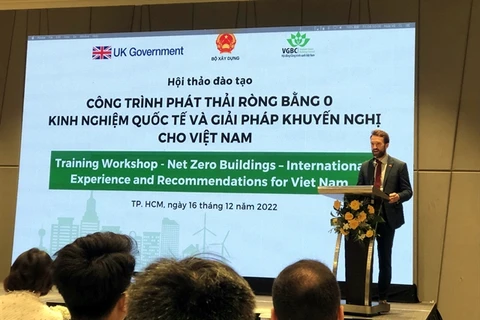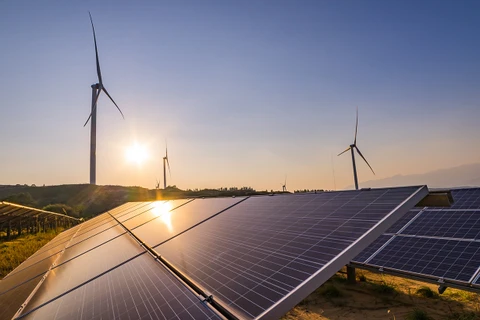Hanoi (VNA) – The Ministry of Industry and Trade (MoIT) has issued an action plan on climate change adaptation to 2030, with a vision to 2025, with a goal of reducing the sector's greenhouse gas emission by 25%-30%.
Under the plan, the proportion of renewable energy in the total primary energy supply will reach about 15-20% by 2030 and 25-30% in 2045. Meanwhile, greenhouse gas emission from power generation is projected at about 42 million tonnes of CO2 equivalent by 2050.
The ministry will promote the shift of business production models towards green growth, which apply solutions for economical and efficient use of natural resources and energy based on scientific-technological advances and digital technology, while developing sustainable infrastructure in order to enhance growth quality, optimise competitive advantages and minimise negative impacts on the environment.
In addition, it will work to improve the ability to adapt to climate change, proactively take measures to prevent and minimise disaster risks and climate change-induced damage on the sector's infrastructure and works, especially those in energy, industry and trade as well as key projects in ensuring socio-economic life in any circumstances.
Development strategies and masterplans of the industry and trade sector for the period from 2021 to 2030 will be reviewed and supplemented with climate change adaptation solutions. The sector will work out measures to enhance infrastructure and key projects' capacity to withstand the impacts of natural disasters, flooding and other extreme climatic phenomena.
Under the plan, the proportion of renewable energy in the total primary energy supply will reach about 15-20% by 2030 and 25-30% in 2045. Meanwhile, greenhouse gas emission from power generation is projected at about 42 million tonnes of CO2 equivalent by 2050.
The ministry will promote the shift of business production models towards green growth, which apply solutions for economical and efficient use of natural resources and energy based on scientific-technological advances and digital technology, while developing sustainable infrastructure in order to enhance growth quality, optimise competitive advantages and minimise negative impacts on the environment.
In addition, it will work to improve the ability to adapt to climate change, proactively take measures to prevent and minimise disaster risks and climate change-induced damage on the sector's infrastructure and works, especially those in energy, industry and trade as well as key projects in ensuring socio-economic life in any circumstances.
Development strategies and masterplans of the industry and trade sector for the period from 2021 to 2030 will be reviewed and supplemented with climate change adaptation solutions. The sector will work out measures to enhance infrastructure and key projects' capacity to withstand the impacts of natural disasters, flooding and other extreme climatic phenomena.
 Enterprises invest in building environmental control systems to reduce CO2 emissions. (Photo: congthuong.vn)
Enterprises invest in building environmental control systems to reduce CO2 emissions. (Photo: congthuong.vn) In the time to come, the MoIT will work with USAID to design and launch strategic plans to accelerate the production and transmission of clean energy, meeting energy demand during the country’s energy transformation from a coal-based structure to one based on renewable energy and natural gas./.
VNA
























